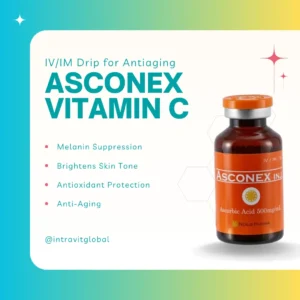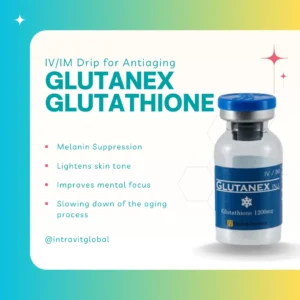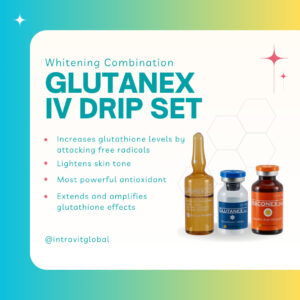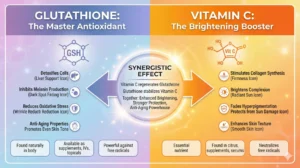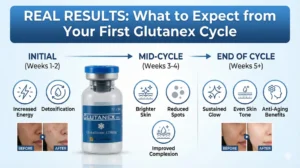Improve your digestion to help with intestinal malabsorption.
1. Introduction
Having a healthy digestive system is crucial for overall well-being. When your digestion is smooth, your body efficiently absorbs nutrients, fuels your organs, and eliminates waste. But what happens when your digestion isn’t working as it should? Issues like bloating, constipation, acid reflux, and gut inflammation can disrupt your daily life.
Vitamins play a significant role in maintaining digestive health. While many people get their nutrients through food or oral supplements, IV vitamin therapy is becoming a popular and effective way to support digestion. This method ensures direct nutrient absorption into the bloodstream, bypassing the digestive system and delivering essential vitamins where they are needed most.
Let’s explore how IV vitamins can improve digestion, which nutrients are most beneficial, and whether this therapy is right for you.
2. Understanding Digestion
Digestion is a complex process that breaks down food into essential nutrients that the body can absorb and use. It begins in the mouth with chewing and saliva enzymes, continues in the stomach where acids break down food further, and completes in the intestines where nutrients are absorbed into the bloodstream.
Common Digestive Issues:
- Bloating and Gas: Caused by poor digestion or food intolerances
- Constipation: Due to low fiber, dehydration, or slow gut motility
- Acid Reflux: Caused by excess stomach acid or weak esophageal muscles
- Leaky Gut Syndrome: A condition where the intestinal lining becomes permeable, allowing toxins to enter the bloodstream
The Role of Nutrients in Digestion:
Your body requires a balance of vitamins and minerals to maintain optimal digestive function. Deficiencies in key nutrients can lead to sluggish digestion, inflammation, and gut disorders. IV vitamin therapy provides an efficient way to replenish these essential nutrients.
3. What Are IV Vitamins?
IV vitamin therapy involves the direct infusion of vitamins and minerals into the bloodstream via an intravenous (IV) drip. This method allows the body to absorb nearly 100% of the nutrients, compared to oral supplements, which can lose potency due to digestion.
Benefits of IV Vitamin Therapy:
- Immediate absorption and effectiveness
- Higher nutrient bioavailability
- Bypasses digestive issues like malabsorption
Common Vitamins Used in IV Therapy:
4. How IV Vitamins Improve Digestion
IV vitamin therapy enhances digestion by:
- Improving Nutrient Absorption: Since IV therapy bypasses the digestive tract, it ensures that essential nutrients reach your cells efficiently.
- Reducing Gut Inflammation: Antioxidant-rich IV drips, such as Vitamin C and Glutathione, help reduce inflammation in the gut lining.
- Supporting Gut Microbiome Health: Zinc and Magnesium in IV therapy contribute to a balanced gut microbiome, which aids digestion and immunity.
5. Key Vitamins for Digestive Health
Here’s a breakdown of key IV vitamins that benefit digestion:
Vitamin B12
- Essential for energy metabolism and digestive enzyme production
- Helps prevent constipation and bloating
- Supports gut motility and nerve function
Vitamin C
- Powerful antioxidant that reduces gut inflammation
- Supports immune function, preventing digestive infections
- Aids in collagen production for gut lining repair
Magnesium
- Relaxes intestinal muscles, promoting smoother digestion
- Helps prevent constipation by drawing water into the intestines
- Supports enzyme function in digestion
Zinc
- Strengthens gut lining and prevents leaky gut syndrome
- Enhances digestive enzyme production
- Supports gut microbiome balance
Glutathione
- Detoxifies the gut and liver
- Reduces oxidative stress and inflammation
- Supports overall gastrointestinal health
6. IV Vitamin Therapy vs. Oral Supplements
When it comes to improving digestion, both IV vitamin therapy and oral supplements have their place. However, they differ significantly in how they are absorbed and utilized by the body.
Absorption Rates Comparison
- IV Therapy: Nearly 100% absorption since it bypasses the digestive system.
- Oral Supplements: Typically 10-50% absorption, depending on digestive health.
People with digestive issues such as IBS, Crohn’s disease, or leaky gut may struggle with oral supplements because their gut lining may not efficiently absorb nutrients. IV therapy provides a direct solution by delivering nutrients straight into the bloodstream.
Who Benefits Most from IV Therapy?
- Individuals with malabsorption disorders
- Those suffering from chronic digestive inflammation
- People with nutrient deficiencies
- Those experiencing fatigue or poor metabolism
Pros and Cons of Each Method
| Factor | IV Vitamin Therapy | Oral Supplements |
|---|---|---|
| Absorption | High (direct to bloodstream) | Lower (depends on gut health) |
| Speed of Effects | Immediate | Slower (takes time to digest and absorb) |
| Convenience | Requires a clinic visit | Easy to take at home |
| Cost | More expensive | Affordable |
| Suitability | Ideal for people with absorption issues | Works for general wellness |
7. Who Should Consider IV Vitamin Therapy for Digestion?
While IV vitamin therapy is beneficial for many, certain individuals may find it particularly helpful.
People with Nutrient Deficiencies
If you have a diagnosed deficiency in B12, magnesium, or zinc, IV therapy can help restore your levels quickly and effectively.
Those with Chronic Digestive Disorders
People suffering from conditions like:
- Irritable Bowel Syndrome (IBS)
- Crohn’s disease
- Ulcerative colitis
- Leaky gut syndrome
…often struggle with proper nutrient absorption, making IV therapy a great option.
Athletes and Individuals with High Metabolic Needs
Athletes and highly active individuals may require higher levels of vitamins and minerals to support digestion and metabolism, making IV therapy an efficient way to replenish their nutrient stores.
8. The Science Behind IV Therapy and Digestion
Scientific research supports the use of IV vitamins for improved digestive health. Studies show that certain nutrients—like Vitamin B12, magnesium, and glutathione—play a crucial role in digestive enzyme production and gut function.
Research Findings:
- Vitamin B12 Deficiency & Digestion: A study found that low B12 levels contribute to digestive discomfort and sluggish metabolism.
- Magnesium & Gut Health: Research indicates that magnesium improves bowel regularity and prevents constipation.
- Glutathione & Inflammation: Studies highlight glutathione’s role in reducing oxidative stress in the gut, helping people with inflammatory bowel conditions.
Expert Opinions on IV Therapy
Many healthcare practitioners recommend IV therapy for people who have difficulty absorbing nutrients through oral intake. According to some functional medicine experts, IV therapy offers a fast and effective way to correct deficiencies and enhance digestive health.
9. How to Get IV Vitamin Therapy
If you’re considering IV therapy, it’s essential to know where to go and what to expect.
Finding a Certified Clinic or Professional
Look for:
- Licensed medical professionals administering the therapy
- Clinics with good customer reviews
- Facilities that offer customized IV blends based on lab tests
What to Expect During a Session
- A healthcare provider will assess your nutrient needs.
- A small catheter is inserted into a vein, typically in your arm.
- The IV drip lasts about 30-60 minutes, during which nutrients are delivered directly into your bloodstream.
Safety Considerations and Possible Side Effects
IV therapy is generally safe when performed by professionals, but potential side effects include:
- Minor bruising at the injection site
- Lightheadedness or fatigue
- Rare allergic reactions (always disclose allergies beforehand)
10. Complementary Practices for Better Digestion
IV therapy works best when combined with a healthy lifestyle. Here are some natural ways to support digestion alongside IV treatments.
1. Hydration & Its Role in Digestion
- Drinking plenty of water keeps your digestive system running smoothly.
- Water aids in nutrient absorption and prevents constipation.
2. Eating a Balanced Diet
- Include fiber-rich foods like fruits, vegetables, and whole grains.
- Consume fermented foods (yogurt, kimchi, sauerkraut) to support gut microbiome.
3. Exercise & Stress Management
- Regular physical activity promotes bowel movements.
- Managing stress reduces inflammation and helps prevent stress-induced digestive issues like IBS.
11. Myths and Misconceptions About IV Therapy
Myth 1: IV Therapy Works for Everyone
While IV therapy is highly effective, not everyone needs it. Those with adequate nutrient levels may not see significant benefits.
Myth 2: IV Therapy is Only for Sick People
IV vitamin drips are not just for people with deficiencies—they are also used for wellness, energy, and athletic performance.
Myth 3: You Can Overdose on IV Vitamins
A professional clinic will tailor dosages to your body’s needs, preventing overdosing. However, too much of certain vitamins—like Vitamin C or magnesium—can lead to side effects.
12. Cost and Accessibility of IV Vitamin Therapy
Average Pricing for IV Therapy Sessions
Prices range from $100 to $300 per session, depending on the clinic and ingredients used. Some high-end IV treatments may cost more.
Availability in Clinics and Mobile Services
Many wellness clinics offer IV therapy, and some services even provide mobile IV therapy, allowing treatment in the comfort of your home.
13. Potential Risks and Side Effects
While IV therapy is generally safe, it’s important to be aware of the risks.
Common Side Effects:
- Minor pain or bruising at the injection site
- Lightheadedness
- Nausea (rare)
Who Should Avoid IV Therapy?
- Pregnant women (unless recommended by a doctor)
- People with kidney disease (high doses of certain vitamins can be harmful)
- Those with allergies to IV ingredients
14. Success Stories and Testimonials
Many people report significant digestive improvements after trying IV therapy.
Real-Life Case Studies:
- Case 1: A 45-year-old woman with chronic IBS found relief through weekly B12 and magnesium IV therapy.
- Case 2: A professional athlete noticed improved metabolism and gut health after regular IV drips.
- Case 3: A man with leaky gut syndrome saw reduced inflammation after glutathione IV treatments.
15. Conclusion
IV vitamin therapy offers a fast and effective way to improve digestion by providing essential nutrients directly to the bloodstream. It’s particularly beneficial for those with nutrient deficiencies, digestive disorders, or high metabolic needs. However, it should be combined with a healthy lifestyle for the best results.
If you’re struggling with digestion, IV therapy could be a game-changer!
FAQs
How often should I get IV therapy for digestion?
- It depends on your needs, but many people start with weekly or biweekly sessions.
Can IV therapy help with bloating?
- Yes! IV vitamins like magnesium and glutathione can reduce bloating and inflammation.
Is IV therapy painful?
- Most people feel a small pinch, but it’s generally well-tolerated.
Can I combine IV therapy with probiotics?
- Absolutely! Probiotics and IV therapy work great together for gut health.
Does insurance cover IV vitamin therapy?
- Most insurance plans do not cover IV therapy unless medically necessary.
-
Hot-Sale
Asconex Vitamin C (Ascorbic Acid) IV/IM Drip for Antiaging, Melanin Suppression, Antioxidant and Skin Brightness Benefits
£38.00 – £70.00Price range: £38.00 through £70.00 Select options This product has multiple variants. The options may be chosen on the product page -
Hot-Sale
Glutanex Glutathione 1200mg IV Drip for Antiaging, Melanin Suppression, Antioxidant Skin Brightness Benefits
£65.00 – £120.00Price range: £65.00 through £120.00 Select options This product has multiple variants. The options may be chosen on the product page -
Hot-Sale
Glutanex IV Drip Set, Whitening Combination Kit with Glutathione, Vitamin C, Lipoic Acid for Antiaging, Skin Brightness Benefits
£30.00 – £250.00Price range: £30.00 through £250.00 Select options This product has multiple variants. The options may be chosen on the product page
Checkout our Facebook Page and leave your review about our Health Care Products.


